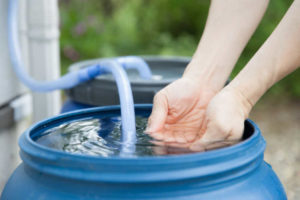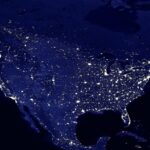You know Your Survival Guy wants you to have a well-thought-out water storage plan. If you haven’t already downloaded a copy of my special report, Emergency Water Storage: How Much, Containers, Purification & More, you should do so today. One area of interest not covered deeply in my report is harvesting rainwater. Recently, Dr. Joseph Mercola ran a great piece on rainwater collection, and I want to share with you some of the points he made as an addendum to Emergency Water Storage: How Much, Containers, Purification & More.
Mercola’s most important information discusses the benefits of using rainwater to irrigate (as opposed to tap water), and also how to keep your rainwater clean enough to use. He writes:
The solution I’ll focus on in this article involves installing one or more rain barrels. This won’t work if you live in an apartment, but if you have a home, it’s an excellent long-term solution. In the video above, BlueBarrel founder Jesse Savou explains how to set up a gravity-fed drip irrigation system for your garden using several rain barrels.
The BlueBarrel rainwater catchment system includes a series of rain barrels set on top of a couple of cinder blocks to achieve a 3-foot elevation. The barrels are connected with PVC pipe, and the barrel on one end is connected to a drip irrigation hose with a timer. The pipe is equipped with a fine-mesh filter to prevent debris from clogging the emitters.
The timer Savou uses is solar operated, so no electricity is required. It will also work with AA batteries if you don’t have a lot of sun. The two types of driplines they sell with their kits are both nonpressurized and work by gravity alone. “You don’t want to use regular drip equipment or compensator lines,” Savou warns, “because you won’t get good output.”
If you don’t have a garden, and despite looming food shortages don’t want to start one, this water can save you in the case you lose your tap water as well. A system like this can provide a lot of peace of mind, as the water will be replenished indefinitely without you having to do any work.
The only thing that will threaten you water supply is a persistent drought. That said, you do have to take precautions to keep the water in your barrels clean, which I’ll review in a later section.
This is not the system I use. Since I have a full acre of land to grow food on I need loads more water, so I have a 5,000-gallon cistern that collects rainwater from the gutters on my roof. This serves to augment my irrigation system but is also a large emergency source of water.
Why Irrigate With Rain Water?
While we’re on the topic of gardening, there are good reasons to install a gravity-fed drip irrigation system even if you’re not concerned about having a backup water supply, as rainwater benefits your plants in ways that tap water cannot. As explained by Mercury News:
“You could deliver 14 inches of water … through sprinklers or hoses or drip emitters and your plants would not look as good or be as healthy as when the same amount of water, in the form of rain, is heaven-sent …
There are several reasons rainwater is more suitable for plants than tap water, but the most important is chemistry. In tap water, chlorine is a necessary disinfectant and fluoride is added … Nearly all plants, however, are susceptible to chlorine toxicity, usually expressed in burnt leaf margins …
[P]ines, yuccas, and fruit trees, in particular, are subject to fluoride toxicity as well, with symptoms ranging from burnt, discolored, or spotted leaves to stressed fruit that may become diseased.”
Rain water also has the following benefits over tap water:
- It contains far lower concentrations of minerals such as calcium, magnesium and sodium. Calcium and magnesium can leave white sediment deposits on plants, and sodium (used in water softeners) is toxic to plant tissue. Sodium also damages soil structure by dispersing beneficial aggregates, thereby causing the soil surface to crack.
- Rainwater pulls down elements of nitrogen (nitrate and ammonium) from the air, which are taken up by plants’ roots and leaves. Air is 78% nitrogen, and nitrogen makes the plants greener. This is why a good rain makes greenery pop with fresh color.
- Rainwater also contains higher concentrations of oxygen than tap water, which prevents root rot.
- It also brings down carbon dioxide, which is beneficial for plants. Carbon dioxide is what gives rainwater an acidic pH. In the soil, this acidic water releases important plant nutrients such as zinc, manganese, copper and iron, making it more available to your plants.
- Rainwater is distributed uniformly across the garden, so the entire root zone is watered. Rain also helps flush salts that have been deposited by tap water away from the roots. These salts impede plant growth, and once flushed further down below the root system will result in pronounced growth.
How to Keep the Water Clean
As mentioned, you do want to make sure the water in your barrels is as clean as possible. Basics include:
- Keeping trees away from the roof to prevent leaves and debris from collecting in your gutters. A leaf guard on your gutters will be helpful
- A metal roof is preferable if you have the option; shingles will require better filtering as they can add petrochemicals from the roofing material into the water
- Always install a preliminary filter like a leaf diverter, plus a screen on the inlet going into the barrel
- Treat the water with bleach once a month. This will help prevent algae growth. All you need is 1/4 teaspoon per gallon of water, or 2 to 4 tablespoons for a 55-gallon barrel. Beneficial microbes can also be used in lieu of bleach. One such product is Nutri-Life BAM
- Test the pH of your water once a month using a standard pH test strip. If the water is neutral or alkaline (aka “hard” water), add baking soda to bring back its acidity. For a 55-gallon barrel, you typically only need a couple of tablespoons to correct the pH balance. Vinegar is another option for lowering the pH
If the inside of the barrel gets slimy or visible algae is growing in it, if you notice waterborne insects such as mosquitoes breeding in it, or if the water smells bad, you’ll need to flush and scrub the barrel.
Ideally, empty and scrub each barrel once a year before the heaviest rain season. Under ideal conditions, you may only need to scrub them every other year. For detailed instructions on how to clean the barrel, see Homestead in Hawaii’s essential guide on keeping your rain barrels clean.
Before you begin a water storage program, here are some things to think about.
- What’s the water for? Are you drinking it? Flushing the toilets with it? Using it in the garden? All these forms of water demand different sources, storage, and sterilization methods. Can you use clean drinking water to flush the toilet? Sure, but you can’t use grey water to boil your pasta.
- Where are you keeping the water? Do you have the storage room it takes to handle gallons and gallons of water? Will you need to move it around? Water is heavy. If you’re infirm, you want to get set up so you’re water isn’t too far away.
- How long do you plan on it lasting? You can read my special report, Emergency Water Storage: How Much, Containers, Purification & More for guidance on how much water you’ll need. But you need to take into account how many people you plan on supporting with your water storage.
- What’s your climate and geography like? Maybe you live in the desert, or maybe you have a lake house on Lake Superior. Obviously, the water storage demand for these two locations will be vastly different. Desert dwellers need to consider that there’s nothing left after their storage runs out. Lake or river dwellers may consider themselves immune from water shortages (but they should not forget purification methods. That’s something else you can find more about in Emergency Water Storage: How Much, Containers, Purification & More.
- What’s it going to cost you? Water storage from scratch may not be cheap. Barrels, tanks, hoses, purification supplies, and on and on. Like any pursuit, you can spend as much as you want on water storage. The costs can stack up. At the risk of redundancy, you can read more about the costs of water storage in my special report Emergency Water Storage: How Much, Containers, Purification & More.
Action Line: Be sure to consider all these things before starting your water storage program. Different answers to any of these questions could suggest vastly different solutions. If you need an extra push to stay on target and achieve your goals of water security, click here to sign up for my free monthly Survive & Thrive letter. I’ll help push you across the finish line of success.
E.J. Smith - Your Survival Guy
Latest posts by E.J. Smith - Your Survival Guy (see all)
- Yes, Money Can Buy You Happiness - April 23, 2024
- State Income Taxes and the 2024 NFL Draft Class - April 23, 2024
- This ARK is Sinking - April 23, 2024
- “That’s Why I Hired You,” They Tell Me - April 22, 2024
- The Silver Lining of Higher Interest Rates - April 22, 2024
















